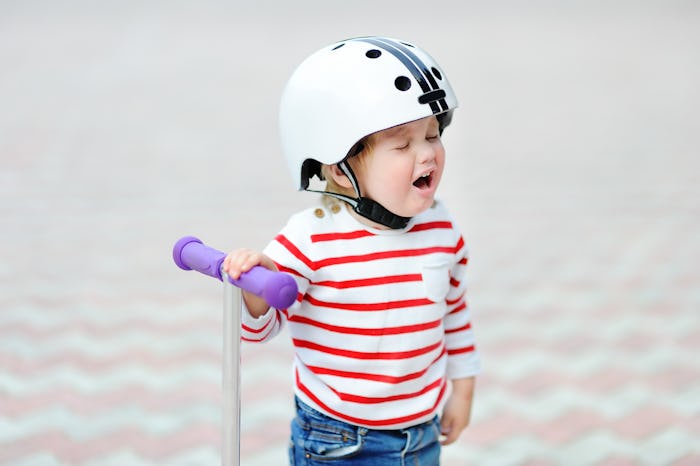Life

My kids do not discriminate when it comes to tantrums. It doesn't matter if we are in a store, the park, or a party — when the mood strikes, they let loose as if there is no one else in the world. I've also seen other kids doing the same in line at Target and at the airport. These fits are hard on parents and make you wonder how someone so small can have so much emotion. But how much is too much? Can you determine the signs your kid has anger issues and isn't just having a tantrum?
It's not always easy being a kid. It takes time for them to learn how to voice their feelings, especially the strong ones they don't fully understand. According to Psychology Today, anger is a primary emotion that is part of human make up. This emotion can be prompted for various reasons, so understanding what is causing your child to feel so angry is the first step in helping him to manage this emotion.
If you feel like the tantrums in your house are crossing a line into something different, consider these seven signs your child has some issues with anger and it's just throwing a fit.
1
They Have No Control
We all feel angry sometimes, but learning how to calm yourself before crossing a line means gaining control over than anger. Giving into instincts and not having a way to calm down is one way kids let us know they have a problem with anger, according to Psychology Today.
2
They Are Quick To React
When looking for anger issues in kids, you'll want to notice how they respond when they feel something is unfair. As the website for Great Schools pointed out, an intense and quick response to anything that has upset the child is a warning that anger is getting the better of them.
3
They Partake In Dangerous Behavior
If actions go beyond crying and yelling when the anger strikes, it's a sign of anger overload. When a child's behavior is dangerous to herself or others, than she needs some help with managing anger, according to the website for the Child Mind Institute.
4
They're Also Sad
At times, it may be hard to see, but many emotions go hand in hand. As the Child Development Institute's website pointed out, children with anger problems may also be experiencing sadness or depression.
5
They Have An Increased Loss Of Temper
Noticing the frequency of your child's anger increasing? Time to step in. According to the American Psychological Association, increased anger and outbursts of anger are a red flag for parents to intervene.
6
They Can't Stop Themsleves
When angry outbursts last longer than a few minutes, they are crossing the line into more serious issues. "With anger overload, the child becomes totally consumed by his angry thoughts and feelings," Great Schools reported. "He or she is unable to stop screaming, or in some cases, acting out physically, even when parents try to distract the child or try to enforce limits and consequences."
7
Their Outbursts Interfere With Daily Life
When anger is a problem, it can start to affect all areas of life. As the Child Mind Institute pointed out, anger becomes a problem for children when it interferes with school, friendships, family/home life, and self-esteem.